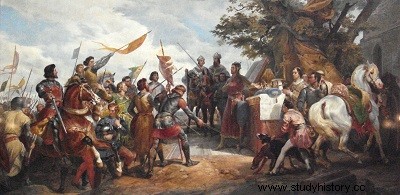
So here is Philippe returned to his kingdom. Having lost his hair, from an extreme nervous weakness, he recovers little by little and begins to think. Richard wants to keep showing off unnecessarily in the Holy Land Too bad for him if his opponent does a good job in his absence. With the complicity of the clever Jean sans Terre the Norman Vexin, the counties of Aumale and Eu are occupied. Worried, Richard realizes that his home is on fire and abandons operations in the Orient. This scatterbrain was intercepted on his return by the Duke of Austria, whom he foolishly and seriously offended at the crusade. Strongly encouraged by Jean sans Terre and Philippe Auguste, Duke Bard his prey, then handed it over to the Germanic Emperor Henry VI who did not release it until 1194 for a good ransom.
Richard is determined to make his enemies pay dearly for their attitude. “The devil is unleashed,” said the emperor. Barely freed the devil engages hostilities. Things turn out badly for Philippe, beaten at Frétév. (1194) then in Courcelles near Gisors (1198 when Richard died providentially in April 1199, in front of Châlus, during an expedition without greatness.
Since 1196, the King of France has ensured 1 guard of the young Arthur of Brittany, son of Geoffroy. According to feudal law, Arthur belonging to a branch prior to that of John, must inherit, if not the kingdom of England, at least an important part of the Plantagenet empire. the new king of England, John, is reluctant to give his nephew what is his.
Against the last son of Henry II, Philip therefore has an excellent weapon:he defends legitimacy After the invasion of Normandy, John can only be recognized as king in exchange for the cession of Norman Vexin, Évrecin and Western Berry.The Treaty of Goulet, which decides on this in 1200 , also provides for the marriage of Prince Louis de Franc (Louis VIII) with a niece of Jean sans Terre, daughter of Alpho nse VIII and a Plantagenet, Blanche of Castile.
This treaty preludes to large-scale conquests. Jean has no intention of keeping his promises. For his part, Philippe thinks only of catching him at fault. He doesn't have to wait long. The very year of the treaty, Le Plantagenêt kidnaps and marries the fiancé of Hugues de Lusignan, son of the Comte de la Marche.
Cited before the court of the King of France, he neglects to appear. Then the court pronounces the committal of its fiefs, part of which is confirmed or ceded to Arthur (Brittany, Maine, Anjou, Touraine), against payment of homage of course (1202). After the capture (August 1202) and the assassination (April 1203) of his protege, Philippe seizes, in execution of the sentence, Château-Gaillard, Rouen, Maine, Touraine, Anjou and of almost all of Poitou.
It seems that England itself is coming when the pope excommunicates John Lackland and pretends to grant his succession to the king of France (1213 ). But, at the cost of an oath of vassalage to the Holy See, soon followed by a capitulation before the great, John maintained his throne.
In the meantime, he was able to arouse against its rival a formidable coalition into which entered princes worried about the dazzling progress of the King of France, or dissatisfied with his methods, or more simply felons:the "so-called Emperor Otto of Brunswick, the Count of Flanders Ferrand of Portugal, the Count of Boulogne Renaud de Dammartin. But the English were defeated at La Roche-aux-Moines (July 2, 1214) by Prince Louis, while their allies were crushed at Bouvines (July 27) by the king himself assisted by his militias.
Strengthened by these successes which show, for the first time to such a degree, with such enthusiasm, the national unity made against common dangers, Philip launched in 1216 into a new enterprise aimed at the conquest of the 'England. Taking advantage of a revolt of the English barons against the odious Jean, Prince Louis arrives. Complete success:the barons recognize Louis as king and have him crowned. It is then that the dramatic change occurs:Jean dies; the hatred amassed against him no longer works against his son. Louis must board again.
Nevertheless, Philippe remains in possession of the land conquered on the continent. In addition to the dismembered regions of the county of Flanders, in addition to the countries annexed on the occasion of campaigns carried out directly against the Plantagenêts, he seized most of the county of Auvergne* (constitution of the Terre d'Auvergne) that he definitively fragmented and separated from the Aquitaine movement. He consolidated the nucleus of the royal domain through useful acquisitions, notably in Gâtinais (Montargis) and in the Pays de la Loire Moyenne (Gien). Moreover, without pronouncing annexation, he established an administrative control, therefore established his political influence, on quite a number of fiefs:this is the case of Champagne where he exercised his tutelage under the minority of Thibaud IV; this is also the case of the county of Boulogne seized in 1212 and returned in 1224 to Renaud's daughter, Mahaut, wife of Philippe Hurepel. Finally, a number of southern lands entered the royal movement directly under his reign (Tournon, Valentinois, Cahors, Gourdon, etc.).
There is a region where he could not venture, certainly for lack of time, perhaps also because he felt he had shown enough good will towards the pope:Languedoc. Fortunately for the monarchy, Simon de Montfort undertook the work, not so much by temporarily appropriating the property of the Count of Toulouse (which worried Philippe Auguste) as by eliminating the Aragonese danger at Muret*. Muret, la Roche-aux-Moines, Bouvines:three battles fought in the same year (1214), three battles which undermined or drove out of France three foreign sovereigns (Pierre II d'Aragon, Jean sans Terre, Otton) including two , possessing important fiefs in our territory, were, so to speak, permanently installed so that the King of France was not master in his kingdom.
